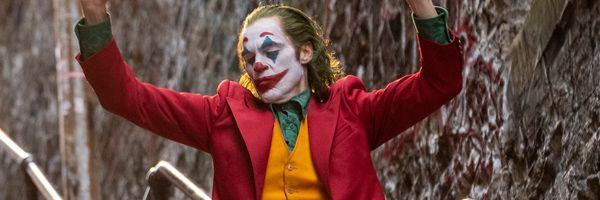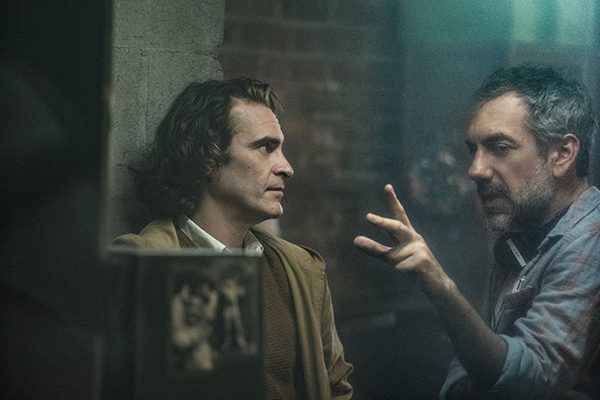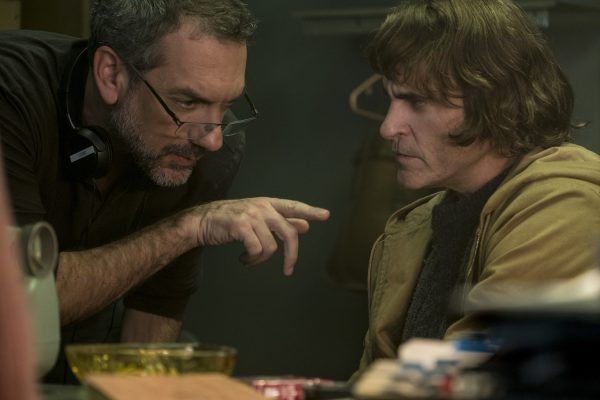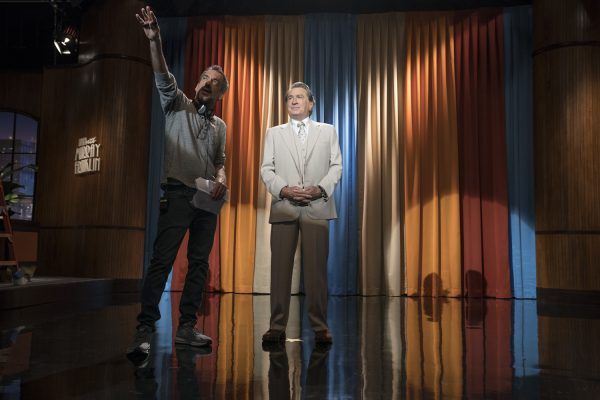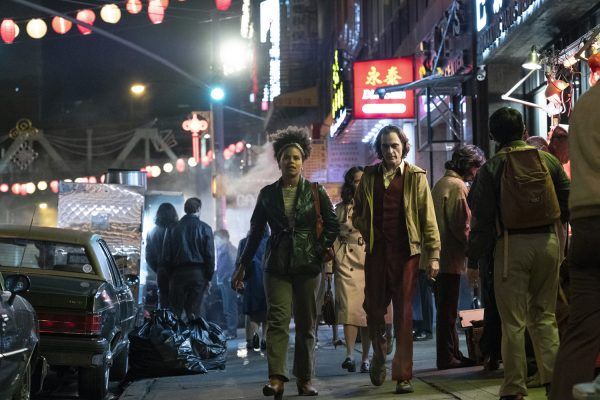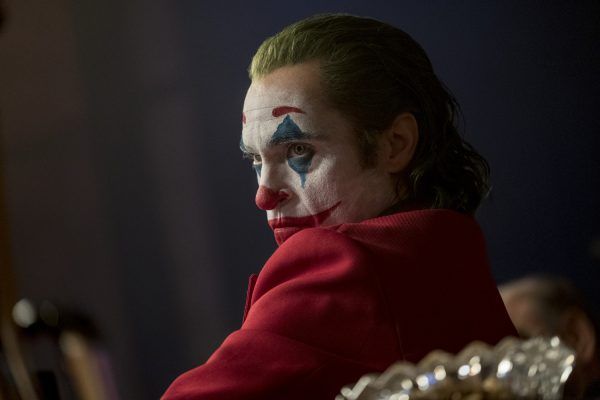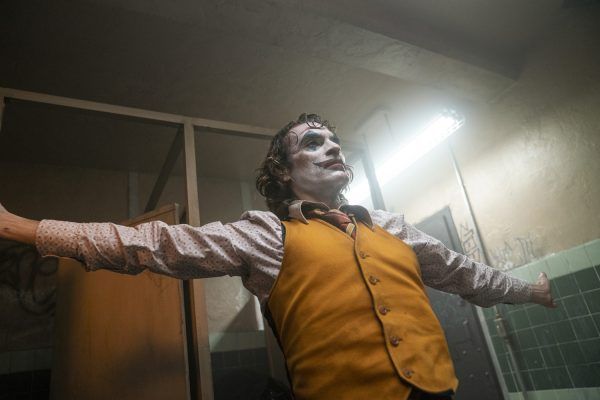The Warner Bros. film Joker, which racked up 11 Oscar nominations last week, is not your traditional comic book adaptation. That’s true of not just the narrative of the film—in that it’s a character study more than a set piece-driven story—but also the filmmaking and construction of what we see onscreen. Director/co-writer Todd Phillips pushed for a gritty, naturalistic aesthetic that reflected the world inhabited by Joaquin Phoenix’s Arthur Fleck, and everything we see in the film is from Arthur’s point of view. Indeed, subjectivity plays a major role as the story progresses and the audience begins to question if what we’re seeing is real, or if it’s simply what Arthur wishes to see.
Piecing all of that together would be a challenge for any film editor, but throw in the fact that Phoenix was delivering a raw, dynamic performance that would shift throughout filming added a further level of difficulty. When I spoke to the film’s editor Jeff Groth, who was nominated for an Oscar for his work on the movie, he admitted that a performance like Phoenix’s—through which he offers up various different yet equally valid takes on any given scene—provides a number of challenges for an editor. But it’s a good problem to have.
During our interview, Groth talked about working with Phillips to shape the film in post-production, and how an adjustment to Phoenix’s take on Arthur resulted in them reshooting the very first scene they had shot for the movie. He talked about threading ambiguity throughout the film, and specifically piecing together the two big Murray Franklin (Robert De Niro) scenes. And he also revealed how Phoenix and producer Bradley Cooper would both heavily involved in the editing of the film, offering up insights and suggestions that ultimately made the movie better.
Check out the full interview below.
What were your initial conversations with Todd like about what this film would be and what kind of the style it would be?
JEFF GROTH: Well, I guess the first thing is I read the script fairly early on, and my reaction to it, in addition to everything was great, was that it was probably the clearest script I've ever read in terms of knowing the kind of movie Todd wanted to make. So what ended up on screen, in my mind, came through in the script. We didn't have a lot of conversations about, necessarily, what the movie was going to be after that point. Once you get into post-production you have a lot of conversation, after it's done shooting. So, while I was assembling it and prior to that, I don't think we felt the need to discuss it that much because it was very clear.
Once it got into editing, did it seem like the project had morphed at all during that production process, as I know so many films can?
GROTH: Yeah. I mean everything does to some extent. Once somebody brings it to life, you find things that are too long, find things that need to be expanded upon. Joaquin definitely changed some aspects of his performance of Arthur a little ways into shooting, and so we just had to adjust to those. So it definitely did change, but I would say to look at the original and look at the finished product, it's not off base at all, it's very similar.
I know Todd and Joaquin have talked about how they ended up reshooting some of those initial scenes. What was that original take on Arthur? Was it much different than what we see now?
GROTH: It's hard to describe. I mean, that's the thing. We ended up reshooting a scene that we shot on the first day. I remember looking at those dailies on the first day and thinking that it was absolutely incredible. And I even told Todd that everybody was going to think we're crazy for reshooting the scene later, because it was so good (laughs). But it just wasn't quite the right version of Arthur, and it is, ultimately, a much better version of Arthur that came out. I think it ultimately came from him playing Joker in the middle of the movie, that he saw aspects of Arthur that he wanted to explore.
Interesting.
GROTH: So, yeah, as far as differences, it would be really hard to describe the differences, but it was... You would definitely notice it, and things that remained in the movie from that original Arthur, we tweaked. You could tell we needed to adjust those.
Joaquin is clearly one of the best actors of his generation, and from everything that he and Todd have said, it sounds like this was very much an organic process of him finding the character throughout shooting and also maybe a little uncomfortable for him. I'm just curious, from your perspective, you're getting the dailies in and you're getting the footage in, what is it like piecing a performance like that together? Because I know he improvised a bit, and it feels like you may have had a lot to work with there.
GROTH: It is insanely difficult and insanely rewarding because everything he was doing, it was great. I mean, it was like everything he was putting out there was valid for the character. So you'd get five different versions of this character, and once you get started, it's hard to know where to go to begin with because you don't have the context for what else the character's done. So, once you get into it, it becomes a little easier once you've got some things down there, but then you do have to go reevaluate what you've already laid out and say, "Okay, now is this still who the character is?" The great part about it is that you always have something that you could go to. He could adjust that performance and he could say, "Okay, he's done this other thing that was equally as good and was just in a different way, and now, Arthur's more this way and we'll go with that." So in my mind, it’s the best case scenario. It's a lot of work, but it's work that you love.
It's an abundance of great choices there, it seems like.
GROTH: Yeah. Which makes it pretty difficult actually. It doesn't make it any easier (laughs).
Point of view is a really big deal in this movie, as is subjectivity. Obviously the film is heavily influenced by Scorsese's King of Comedy, and I was really struck watching it again a few days ago by the first Murray Franklin sequence where we're seeing it through Arthur's eyes and Arthur's in the audience. It drills down that we're seeing this movie through Arthur's eyes and maybe he's an unreliable narrator. How did that affect your job, and was that first Marie Franklin sequence the key to nailing down the subjectivity of the experience?
GROTH: That was always in there from the script, so I think that we ultimately did more blending of the reality and fantasy after that point, or at least it feels like that. Up until that point, it's a pretty straightforward thing when you are seeing from his perspective. I mean, Joaquin is in every scene in the movie. So it’s always his perspective and you never wanted to show anything that wasn't, even prior to that. But yes, it's a clue that not only... it's like you're seeing what he wants and you're seeing what he wishes for and his hopes and dreams all encapsulated in that fantasy. So it is, I suppose, the beginning of a tip off that he might be unreliable, but also it draws you closer to him. He's drawing you in at the same time.
It may not be real, but it feels real because it feels real to him.
GROTH: Right. Because he wants to be real. He so wants it to be real, and not even necessarily the literalness of being on Murray and having Murray being a father figure, it was just the wish for a father figure.
That goes hand-in-hand with the fact that there's a lot of ambiguity in the film, especially as it pertains to the ending where you get to this final scene where it throws everything you've seen before into a different context, in that maybe he was just telling a joke. Was there ever a version of the movie that was a little bit more explicit about what actually did and did not happen?
GROTH: Not really. That final scene was always there. There were three lines that were cut out, but it's not that that would've explained anything. It was always just a great line to end on for the movie was that “You wouldn't get it.” I mean, it seems like a pretty classic line (laughs).
Once you did get into post, what were your conversations with Todd about toeing that line of ambiguity and threading in the idea that Zazie Beetz's character was in his head? Did you guys play around with how much you wanted to be ambiguous and how much you wanted to tell the audience like, "Well, this might actually be true."
GROTH: To be very specific about one character is that, what I always love about it is you have, in so many movies, this standard like, "Okay, there's this love interest." And to watch the movie the first time and seeing this woman that is apparently interested in him, and it's like, "Oh, boy, that could be just as a cheap thing that we're shoehorning in there." And then, to have that turn on its head and say, "No, no, actually, we weren't doing that at all. Of course you were right the whole time. Why would she be interested in him?" Was always something that I loved about that ambiguity.
As far as the rest of it goes, Todd was definitely dead set about taking everything and looking at it through a realistic lens, and I think that also was a little bit of a key to the fantasy. Is that the fantasies are all very realistic. Outside of that Murray one, which is very clearly a fantasy, everything else, you look at it, it's like, "Well, that could happen in a different version of Arthur's life."
I think one of the most striking sequences of the entire film was that final Murray Franklin sequence. And I was struck by the editing of that piece and the building of tension and you think you know how it's going to go and then it goes a different way. How did you go about putting that sequence together?
GROTH: I was actually on set for that final Murray Franklin appearance, just because it was such a big set. It was so important that we knew what we were getting as we're going along. So, all those TV cameras were running at the same time, but we had the film cameras running. And I would take the line cuts from the TV camera and put together what was essentially a TV appearance. So, in the TV aspect ratio, it's what he would have seen if he were watching the show at home, it was just pick their favorite takes and making sure we got everything and as we've gone along. So, ultimately at the end of the week, there's this 10-minute version of the Murray Franklin sequence but not anything that it looks like now. I mean, many of the takes are the same, but then it was a matter of saying, "Okay, let's take it now back out of TV cameras and put it back into the wider film cameras and then say, okay, now how do these things work? When do we want to be closer? Did we get this shot in that angle?" And then it was just reconstructing it in a way backwards from that.
I just think the way that that scene builds tension is really well-done and the choice of shots as you're getting closer and closer until that final moment, I think is really impactful.
GROTH: And that's the thing. Last year, there was a question about what happened to Zazie's character actually, and there had been a shot where she was watching that TV in the end, which felt like, "Okay, she's no longer part of the story, for one," but also that we wanted to stay within that moment. You don't really see shots of the audience. We only stick with, really, the two, and there's no shot that doesn't have at least one of either Joaquin or Robert De Niro in it, even if you're meant to see Dr. Sally or something like that around them. They're always in the shot, and it was like keeping them in this crucible that you know at some point it's going to ignite.
I think cutting away might have taken the air out of it a little bit.
GROTH: And that was the idea with cutting to the TV cameras because when you see that TV wall it says, "Okay, we can cut away and say everybody's watching without actually cutting away.”
Were there any big deleted scenes you remember removing from the film or anything that was particularly tough to lose?
GROTH: I guess, as you're adjusting performances and things like that, there's always takes that you love for one reason or another that ultimately get lost in favor of something else, and then you'd say, "Okay, well I guess I'm never going to see this take again even though it's fantastic, because now we need to get on this one, which is also good." It's just that we're going with a different version. There was a piece that I think Joaquin talked about, which is there was a scene where he revealed what he'd done to his co-worker, but ultimately, it seemed like too much information at the time that it comes. Why wouldn't his co-worker call the police or something like that if he was that sure? Throughout, there were small things that, like especially in the first scene with the social worker when it was probably a third longer because there was a lot more information given in that, but as it turned out, we didn't need to tell you all about these things because we were going to show you over the course of the movie.
What did you guys learn from your first friends and family screening, and how did the film change after that?
GROTH: We didn't really do that.
Oh, interesting.
GROTH: Yeah. We kept this one pretty close to us. We screened it more personally for people and filmmakers. Bradley Cooper definitely came in a couple of times. He was a producer on the movie, but he definitely watched the movie many times and sat with us. We can call him if we got stuck with something like, "Hey, can you come over and take a look at things?" Joaquin came in and watched it a few times. I think probably he was in the edit room more that any other actor that I've worked with. I suppose there were friends and family screenings, but it would be like two or three people.
Did Joaquin have any particularly strong notes or anything that may have changed the film a bit?
GROTH: I mean, I can't remember specific notes, but what was interesting to have him come in is that he would always be looking to get the feeling from what was on screen to mimic the feeling that he had on the day. It was a really interesting perspective to have in the room. Of course, you're putting together what you're putting together, but then to have somebody saying like, "I lived that moment and here's what I'm feeling." It's another interesting perspective, so kudos to Todd for having him come in.
I imagine that was pretty particularly insightful, as well, and helpful to you as an editor.
GROTH: Yeah, absolutely. It definitely helped to know, when he was concerned about something, to be able to look at it through that lens was super helpful, so that we can address it.
I was going to ask about Bradley Cooper, as well, because, I mean, A Star Is Born is just a stunning piece of work and clearly that guy knows a thing or two about filmmaking and storytelling. So, that's interesting to know that he was in the editing room.
GROTH: Absolutely. He doesn't miss a thing (laughs). He would watch stuff and he would pick out even some of the smallest things and what are some of the things that he can be picked out for us to address. He was definitely a huge help. I think he got a lot more experience in editing than most people would realize.

